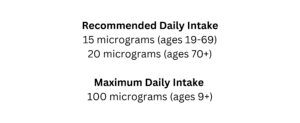09 Dec Are You Getting Enough Vitamin D?
Vitamin D, often called the “sunshine vitamin,” is crucial for our health. However, maintaining adequate levels year-round, especially in winter, can be challenging. This article dives into the significance of Vitamin D, signs of deficiency, and strategies to keep healthy levels, even during the colder months.
The Role of Vitamin D
Vitamin D is essential for many bodily functions:
- Bone Health: It aids calcium absorption, which is crucial for maintaining strong bones and teeth.
- Immune System: It supports the immune system, playing a role in fighting off illnesses.
- Muscle Function: It is essential for muscle strength and can reduce the risk of falls.
- Mood Regulation: It has been linked to mood regulation and may influence the occurrence of depression.
- Heart Health: Studies suggest a potential role in heart health, although still under investigation.
- Cancer Prevention: Some evidence suggests it may help prevent cancer, particularly colorectal cancer.
Deficiency Signs
Vitamin D deficiency can manifest in various ways:
- Bone Pain and Weakness: Insufficient intake can weaken bones, increasing the risk of fractures and osteoporosis.
- Muscle Weakness and Cramps: Low levels are associated with reduced muscle strength, which can lead to falls.
- Fatigue and Tiredness: A sign of deficiency is persistent fatigue and lack of energy, even with adequate sleep.
- Mood Changes: Deficiency is linked to mood disorders such as depression, mood swings, and irritability.
- Increased Risk of Infections: Deficiency can lead to a higher susceptibility to infections, particularly respiratory.
- Impaired Wound Healing: Slow healing of wounds may also be a sign of deficiency.
Increasing Intake
Vitamin D can be obtained in several different ways:
Sunlight Exposure
The body produces Vitamin D when the skin is exposed to sunlight. Around 5-30 minutes of sun exposure, particularly midday, a few times a week, is often sufficient for many people.
Dietary Sources
While few foods naturally contain Vitamin D, some good options include:
-
- Fatty fish like salmon, mackerel, and tuna
- Fish liver oils
- Egg yolks
- Fortified foods such as milk, orange juice, and cereals
Supplements
Supplements can effectively maintain adequate levels for those unable to get sufficient vitamin D through diet and sunlight. Consult a healthcare provider before starting any supplement regimen.
Maintaining Vitamin D Levels in Winter
In winter, the shorter days and reduced sunlight exposure make it harder to produce enough Vitamin D naturally. This is particularly true in higher latitudes with weaker sun rays. Getting enough during winter months requires a bit more effort. Try these tips to ensure you’re getting your daily dose:
Maximize Sunlight Exposure
Try to spend time outdoors during daylight hours, even if it’s just a short walk. The face, hands, and other exposed skin can still cause an increase in production, even in colder weather.
Indoor Sunlight Exposure
Position yourself near windows to bask in the natural light, as the sunlight filtering through the glass can aid in synthesis.
Stay Active
Engaging in outdoor activities like walking or jogging during daylight can increase intake and improve overall health and mood.
Use of UV Lamps
In some cases, lamps that emit UV-B radiation are an alternative source of Vitamin D. However, it’s important to use these devices wisely to avoid the risk of skin damage.
Toxicity Signs
While maintaining adequate Vitamin D levels is essential, excessive intake can lead to toxicity. Symptoms include nausea, vomiting, weakness, and severe complications like kidney damage. That said, toxicity for this vitamin is rare, even for those who spend lots of time in the sun. Always consult your healthcare provider if you have any concerns with your intake.
Conclusion
Vitamin D is crucial for health, particularly in bone and immune system functioning. Understanding how to maintain adequate levels is vital as we navigate through different seasons. Ensuring a sufficient but safe intake is vital for sustaining your overall well-being throughout the year.
Learn More
- For more detailed information on Vitamin D’s role in bone health and cancer prevention, see the American Board of Family Medicine American Board of Family Medicine.
- The Office of Dietary Supplements provides comprehensive information on recommended intakes, sources of Vitamin D, and other related topics Office of Dietary Supplements, National Institutes of Health.


